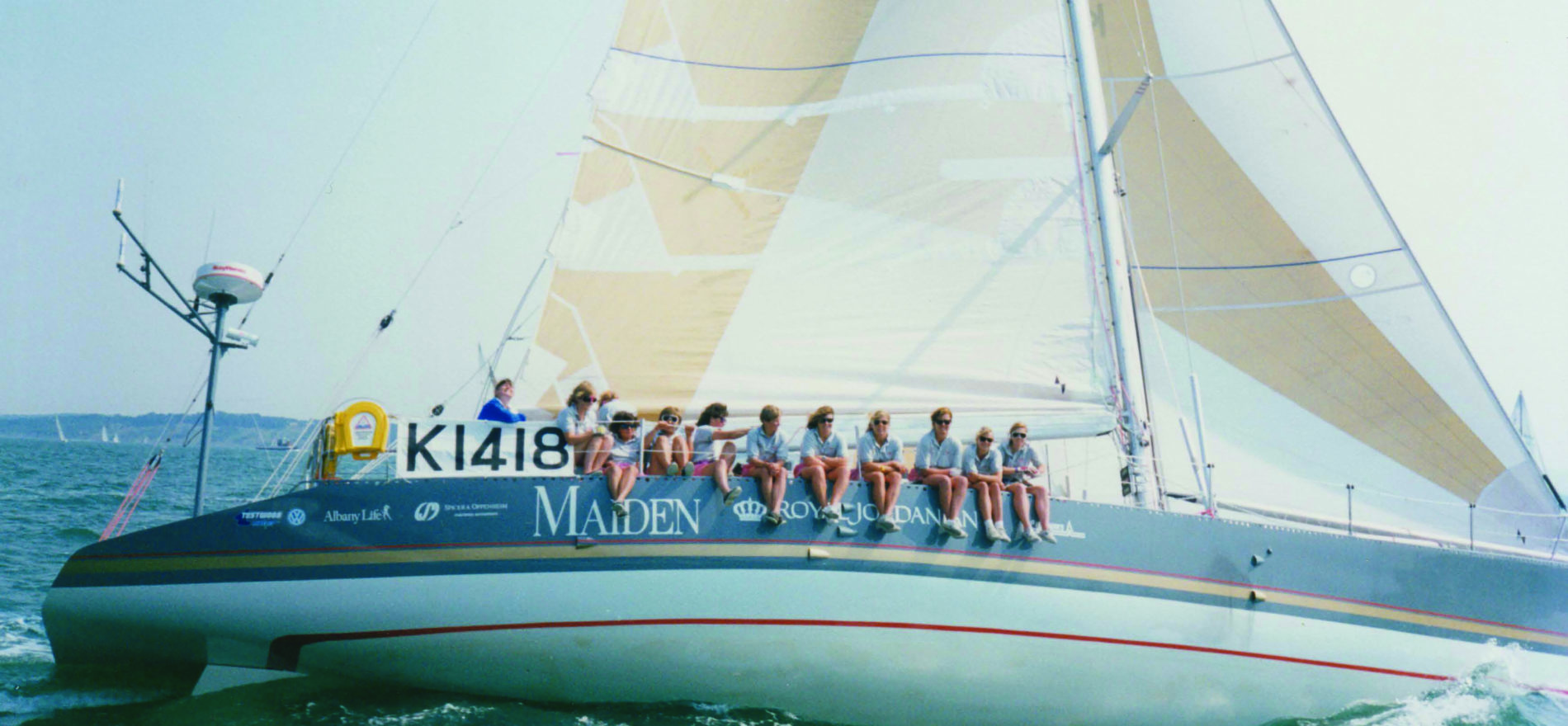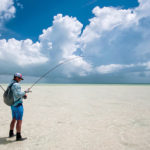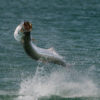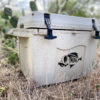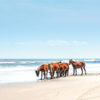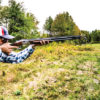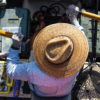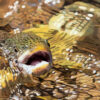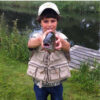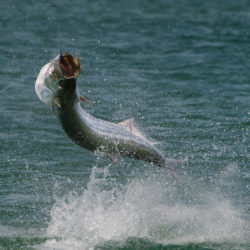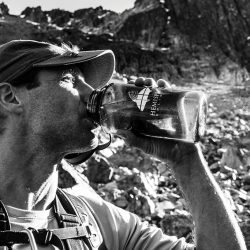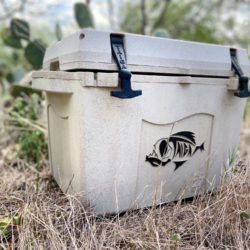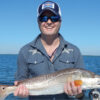Maiden opens with footage of menacing waves and a warning: “The ocean’s always trying to kill you. It doesn’t take a break.”
The voice belongs to British sailor Tracy Edwards, heroine of a film released in North America by Sony Pictures Classics on June 28. Written and directed by Alex Holmes, the 93-minute documentary features Edwards, who at age 26, skippered the first all-female crew in the 1989-90 Whitbread Round the World Race…
“Maiden is one of those inspirational stories that once heard, you are unlikely to forget,” said Holmes, who first heard Edwards speak at his 11-year-old daughter’s elementary-school graduation.
“It’s the story of a young girl who dared to dream and of a team that came together to challenge chauvinism and set an example to the world. From the moment she started telling her story, I knew she was a remarkable character. As the tale enfolded, I was also struck by the realization that, even after all these years, the world tries to limit our daughters.”
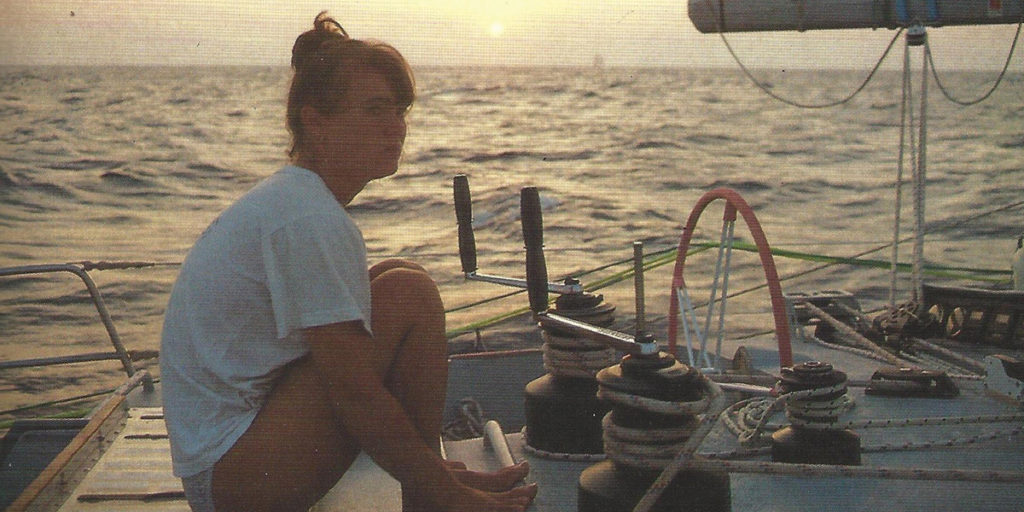
The tale has all the elements of an epic adventure: 50-foot waves, life-and-death drama, near-mutiny, agony and thrilling victory. Prevailing prejudice adds to the mix of this against-all-odds account of perseverance.
The sailing establishment opposed Edward’s dream of racing against men in the Whitbread. Male competitors believed an all-female crew would never finish. Potential sponsors feared the women would die at sea and cause a public-relations nightmare. The chauvinistic yachting press wagered they would fail.
“One journalist at the time [Bob Fisher of The Guardian] called us ‘a tin full of tarts,’” said Edwards. “Then when we won one of the legs coming into New Zealand, he called us ‘a tin full of smart, fast tarts,’ and you know what? At the time we thought that was great. But it was of the time and you can’t change that.”
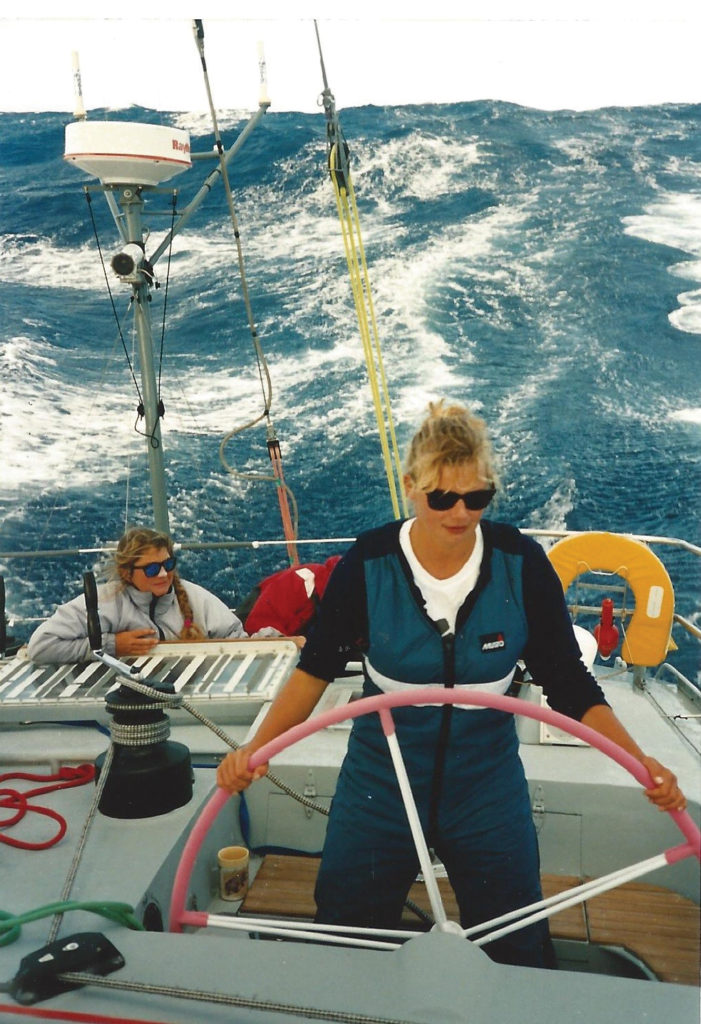
The film gradually reveals the resilient bond that forms among the women during a perilous journey. It does so with the camerawork of Jo Gooding, the Welsh cook on board Maiden, who captured the undertaking on a clunky SVHS camera. The crew’s commentary also adds personal perspective and social context. Male sailing crews were questioned about tactics; the women were asked, “How are you all getting along together?” and “What do you do for chapped lips?”
Introduced in 1973, the round-the-world (and clock) yachting competition was originally sponsored by Britain’s Whitbread brewing company. Known as The Ocean Race today, the triennial tradition is a proving ground and true marathon on the high seas. It is one of sailing’s Big Three events; the others are the Olympic Games and America’s Cup.
The race is an obsession for the greatest sailors, one that was not lost on Edwards. She began traveling the world after being expelled from school when she was 15 years old. Beginning in Greece at age 17, Edwards worked on charter yachts and spent her first transatlantic voyage learning how to sail.
“I found myself day-working in Newport, Rhode Island,” she said. “This meant staying wherever I could and finding work on a daily basis: sanding, varnishing, painting, cleaning bilges. You name it, I did it. Anything to survive.”
She first learned of the Whitbread while working as a stewardess on a charter boat in Newport.
“I was sitting on a friend’s boat one day and I was looking through his books,” Edwards explains in the documentary. “And I pulled one book out and opened it up. I went, ‘What’s this?’ ‘That’s the Whitbread Round the World Race.’ I said, ‘This is absolutely incredible.’ I wanted to be part of it. So, I knew it was just something I had to do.”
The next day, Edwards applied for a job as a cook on a Whitbread boat. “I remember going to the skipper…I said, ‘Are you looking for a cook?’ And he went, ‘We are not having a girl. We are not going to be the only professional racing team in the world with a girl on the boat.”
Devasted, Edwards returned to her boat, where by chance, she was told they had an important charter. The client turned out to be King Hussein I of Jordan. Edwards was washing dishes in the galley when Hussein walked in. The two began a friendly conversation; Hussein was fascinated by her life and passion for the Whitbread. He told her she must do it.
Inspired, Edwards convinced the skipper to hire her and became the cook—and the only woman—on the South African boat Atlantic Privateer. It was on the Atlantic Privateer that Edwards first encountered the yacht that would become Maiden; both boats rounded Cape Horn in the icy waters of the 1985-86 Whitbread.

Originally named Disque D’Or 3, Maiden was named Stabilo Boss when Edwards first laid eyes on the yacht during the 1985-86 race in the Southern Ocean, near Antarctica. Stabilo Boss was skippered by the single-handed sailor Bertie Reed; Edwards communicated with him via radio while rounding the horn. After the race, Stabilo Boss was renamed Prestige and languished in Cape Town, South Africa.
Edwards finished the 1985-86 race and knew she wanted to sail in the 1989-90 race, but with an all-female crew. The “Maiden Great Britain” project was not well received by potential sponsors. Determined, Edwards mortgaged her house to purchase a “wreck with a pedigree” for £110,000. The wreck was Prestige, which was shipped to Southampton, England, for an overhaul.
In 1988, Edwards and her crew spent six months redesigning and refitting the yacht. In September of that year, the Duchess of York graciously christened Maiden and went sailing with the women. Sponsorship soon followed: the team bore the Royal Jordanian Airlines logo, courtesy of Hussein. Maiden was painted in the livery of the planes; the famous gray hull and its red and gold lines became an icon of the 1989-90 race.
On Sept. 2, 1989, 23 yachts met on the starting line in Southampton for the fifth Whitbread. The race had six legs totaling 32,018 nautical miles: (1) Southampton to Punta del Este, Uruguay; (2) Punta del Este to Fremantle, Australia; (3) Fremantle to Auckland, New Zealand; (4) Auckland to Punta del Este; (5) Punta del Este to Fort Lauderdale, U.S.A; and (6) Fort Lauderdale back to Southampton. The race applied time allowances, but four divisions separated the entries and the Whitbread Trophies were awarded to the first boat to finish in each class.
Edwards and her crew shocked the sailing world and completed the race in 167 days and three hours. Although Maiden was smaller than competing yachts, the women won two of the three Southern-Ocean legs in Division D. Two boats did not finish the race and one man perished after being swept overboard. Maiden came in second overall in her class, the best result for a British boat in 17 years. It still remains the best result ever for a female crew.
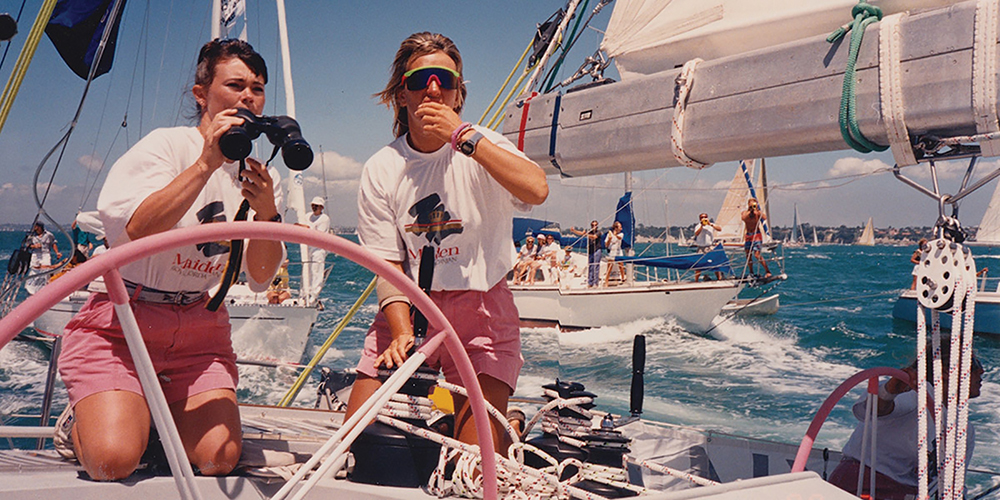
There are difficult and poignant moments in the film. Edwards’ navigational error in the fifth leg results in Maiden achieving a disappointing fourth place in Division D. While crossing the Southern Ocean, dressing extremes match those of the elements; it takes the women 30 minutes to put on and another 30 minutes to take of clothing layers. And their efforts only afford them protection for just a few minutes on the frigid deck.
Then there are lighthearted moments. In Auckland, Maiden is welcomed by more than 14,000 fans even though the yacht arrives in the middle of the night. The ladies also pull a great media stunt during a warmer leg of the race by arriving at the dock wearing bathing suits. They later regret the ploy. Edwards even tells reporters on camera: “I hate the word feminist.”
But the “maiden” voyage did transform Edwards into a feminist. She remains optimistic.
“The great message we always had was simply equality,” she explained. “What’s the difference between 30 years ago and now? My usual answer is: not enough. But there is a difference. Thirty years ago, men were either aggressive towards us, or there was antipathy. Whereas 30 years later, women are not just having the conversation with ourselves. We are having it with men.”
In 1990, Edwards was awarded MBE (Member of the Most Excellent Order of the British Empire) by Queen Elizabeth II. She also became the first woman in its 34-year history to receive the Yachtsman of the Year Trophy.
Soon afterwards, Edwards sold Maiden and the 12 crew members scattered across the globe. She went on to work for the Child Exploitation and Online Protection Center and returned to university to complete a psychology degree.
In 2014, Edwards discovered Maiden had been abandoned in the pirate-infested waters of the Indian Ocean. She raised funds once again to rescue the yacht and bring her home to the United Kingdom for restoration—and a chance to reunite with her original crew members. Edwards also had an idea: Maiden could help raise money to educate girls.
Today, a new generation of all-female crew members are sailing Maiden on a world tour with more than 23 destinations in 13 countries. The crew sails for girls’ education, working with local charities and supporting community-led educational projects.
Edwards is a motivational speaker and has written two books about her experiences. Visit www.tracyedwards.com and www.themaidenfactor.org for more information.
Joe Shields is the editor-in-chief of The Virginia Sportsman. He is a writer and marketing executive based in Charlottesville, Virginia. His writing and photography have appeared in The Virginia Sportsman and other publications. Whether fly fishing or surfing, he loves the outdoors and celebrates sporting life and culture in his narratives.

